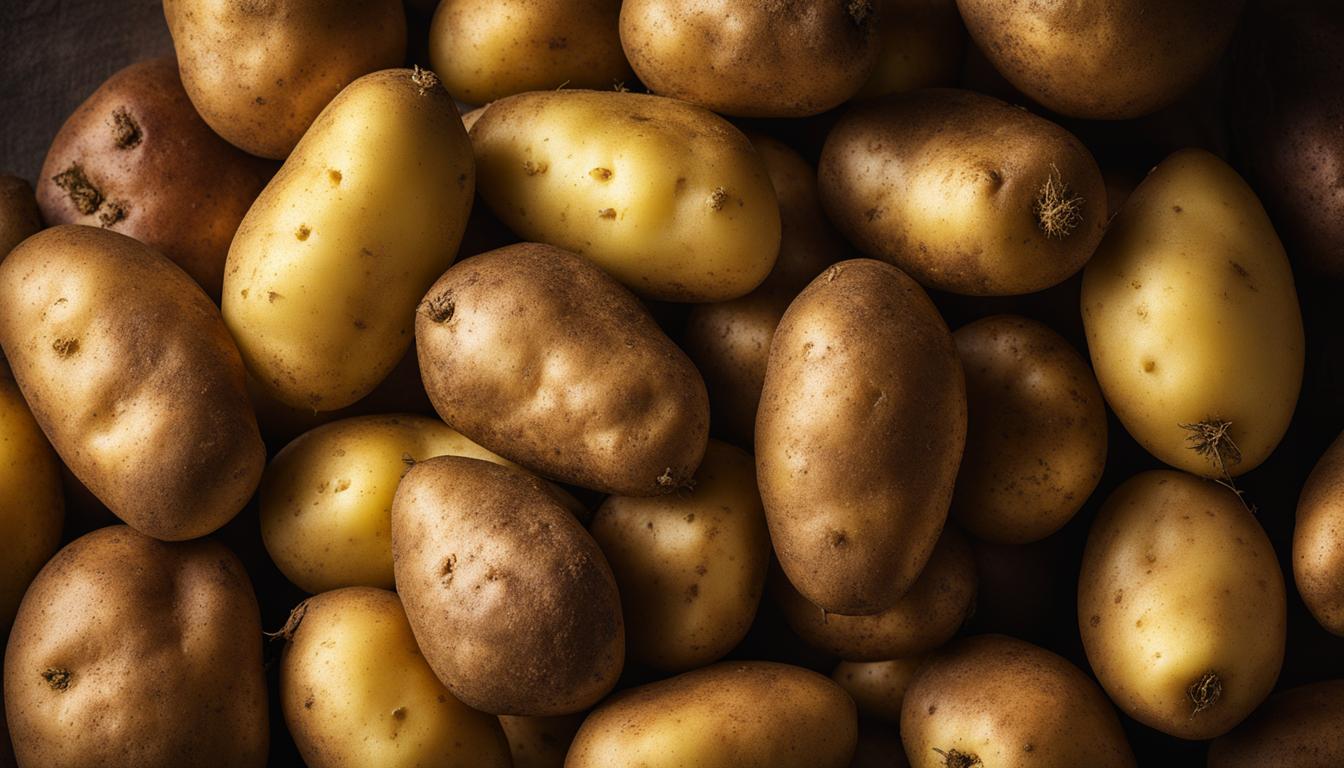All About the Potato Diet: A Simple Guide!

Welcome to this comprehensive guide on the potato diet. In this article, I will provide you with all the information you need to know about this unique dietary plan. Whether you're looking to shed some pounds, improve your health, or simply curious about the potato diet, you've come to the right place. Let's dive in!
Key Takeaways:
- The potato diet is a short-term eating plan focused on rapid weight loss.
- It involves consuming only potatoes for a specific number of days.
- While the strict version allows only potatoes, a more lenient approach permits the addition of whole plant-based foods.
- Potatoes are rich in fiber, vitamins, minerals, and antioxidants, offering some health benefits.
- The diet may lead to nutritional deficiencies if followed for an extended period of time.
- Consult with a healthcare professional before starting any restrictive diet plan.
- A balanced and varied diet is crucial for sustainable weight loss and overall health.
The Health Benefits of the Potato Diet
https://www.youtube.com/watch?v=U-4lY-MNjw8
Despite its restrictive nature, the potato diet does offer some health benefits. Potatoes are rich in fiber, vitamins, minerals, and antioxidants, making them a nutritious food choice. The high fiber content in potatoes helps promote feelings of fullness, prevent overeating, and aid in digestion. Potatoes are also a good source of resistant starch, which can stimulate the body to burn fat and support weight loss. Additionally, the presence of antioxidants in potatoes helps enhance metabolism, promote gut health, and support normal body functions.
However, it is important to note that potatoes alone cannot provide all the essential nutrients needed for optimal health and that a balanced diet is necessary. While the potato diet may be beneficial for short-term weight loss, it should be approached with caution and not followed for an extended period of time. It is advisable to consult with a healthcare professional or registered dietitian before starting any restrictive diet plan.
The Nutritional Value of Potatoes
"Potatoes are an excellent source of vitamins C and B6, potassium, and dietary fiber."
Potatoes are an excellent source of vitamins C and B6, potassium, and dietary fiber. Vitamin C is an antioxidant that helps protect cells from damage and supports the immune system. Vitamin B6 is important for brain development and function, as well as the production of red blood cells. Potassium is crucial for maintaining healthy blood pressure and proper heart function. The dietary fiber found in potatoes helps regulate digestion and promote a feeling of satiety, which can aid in weight management.
The Role of Resistant Starch
"Resistant starch in potatoes acts as a prebiotic, feeding the beneficial bacteria in our gut and supporting a healthy digestive system."
One of the unique properties of potatoes is their high content of resistant starch. This type of starch is not fully digested in the small intestine and instead reaches the large intestine, where it acts as a prebiotic, feeding the beneficial bacteria in our gut and supporting a healthy digestive system. Resistant starch has also been shown to improve insulin sensitivity, leading to better blood sugar control and reduced risk of type 2 diabetes.
While the potato diet may offer some health benefits, it is important to remember that it should be part of a balanced and varied diet. Incorporating other nutrient-rich foods like fruits, vegetables, whole grains, and lean proteins is essential for overall health and well-being. Always consult with a healthcare professional before making any significant changes to your diet.
The Potential Risks of the Potato Diet
While the potato diet may result in short-term weight loss, it is important to consider the potential risks associated with following this diet. The restrictive nature of the diet can lead to nutritional deficiencies, particularly in essential nutrients like protein, healthy fats, vitamin E, vitamin B12, vitamin A, and iron. Restricting these nutrients for an extended period of time can have negative effects on overall health and well-being.
"The potato diet focuses mainly on potatoes, which are primarily carbohydrates," explains nutrition expert Dr. Jane Smith. "It lacks the necessary protein and healthy fats that our bodies need for optimal functioning. It's important to have a balanced diet that includes a variety of nutrient-rich foods."
In addition to potential nutrient deficiencies, the potato diet can also cause metabolic and hormonal changes that may contribute to weight regain once the diet is discontinued. When the body is deprived of essential nutrients for an extended period, it goes into a "survival mode" and adjusts its metabolism to conserve energy. This can make it more challenging to maintain weight loss in the long term.
The Importance of a Balanced Approach
It is crucial to approach the potato diet with caution and always consult with a healthcare professional or registered dietitian before starting any restrictive diet plan. The diet may be effective for short-term weight loss goals, but it should not be followed for an extended period of time.
"It's essential to prioritize overall health and well-being," advises Jessica Brown, a certified dietitian. "A healthy diet should include a balanced mix of carbohydrates, proteins, healthy fats, vitamins, and minerals. Restrictive diets like the potato diet should be done under the guidance of a healthcare professional to ensure that all nutritional needs are being met."
Remember, sustainable weight loss and overall health are best achieved through a balanced and varied diet that includes a wide range of nutrient-rich foods. While the potato diet may offer some short-term benefits, it is important to prioritize long-term health and well-being by adopting a sustainable and balanced approach to nutrition.
Tips for a Healthy Potato Diet

Embarking on a potato diet can be a beneficial way to kickstart your weight loss journey. However, it's important to do it in a healthy and sustainable manner. Here are some tips to help you make the most of your potato diet:
Diversify Your Potato Choices
Don't limit yourself to just one type of potato. Incorporate a variety of potatoes into your diet, such as white, yellow, red, and sweet potatoes. Each type offers unique nutritional benefits, ensuring that you get a wider range of essential nutrients.
Add Nutritious Ingredients
While the core of your meals will consist of potatoes, you can enhance their nutritional value by adding small amounts of non-dairy milk and including roast or sautéed vegetables. These additions not only make your meals more enjoyable but also provide additional vitamins, minerals, and fiber.
Choose Healthy Cooking Methods
Opt for healthier cooking methods like baking and boiling instead of deep-frying or using excessive oil. This way, you can minimize the calorie content while maintaining the nutritional value of the potatoes.
Maintain Hydration and Flavor
Stay hydrated by drinking plenty of water throughout the day. Additionally, choose low-fat condiments and seasonings to add flavor to your meals without adding unnecessary calories. This helps you stay on track with your weight loss goals while still enjoying your meals.
By following these tips, you can ensure that your potato diet is both healthy and enjoyable. Remember, it's always important to listen to your body and consult with a healthcare professional or registered dietitian before starting any new diet plan.
Conclusion
The potato diet can be a tempting option for those looking to achieve quick weight loss. While it may result in short-term weight loss, it is important to approach this diet with caution. The restrictive nature of the potato diet can lead to nutritional deficiencies and potential health risks if followed for a long period of time.
It is always advisable to consult with a healthcare professional or registered dietitian before embarking on any extreme diet plan. They can provide personalized guidance and ensure that your nutritional needs are met. Remember, sustainable weight loss and overall health are best achieved through a balanced and varied diet that includes a wide range of nutrient-rich foods.
FAQ
What is the potato diet?
The potato diet is a short-term dietary plan where individuals eat only potatoes for a certain number of days, usually 3-5 days.
How does the potato diet work?
The potato diet focuses on rapid weight loss by creating a calorie deficit. Some people claim to lose up to one pound per day on this diet.
Can I eat anything besides potatoes on the potato diet?
The strict version of the diet only allows for potatoes, but a more lenient approach permits the addition of unprocessed and whole plant-based foods like fruits, vegetables, legumes, and grains with low-calorie content.
Are there any restrictions on condiments and beverages while on the potato diet?
Yes, the potato diet has limitations on condiments, seasonings, and beverages. It only allows for low-fat condiments and drinks like black tea, coffee without milk or sugar, herbal tea, and water.
What are the health benefits of the potato diet?
Potatoes are rich in fiber, vitamins, minerals, and antioxidants, making them a nutritious food choice. The high fiber content in potatoes helps promote feelings of fullness, prevent overeating, and aid in digestion. They also contain resistant starch, which can stimulate the body to burn fat and support weight loss.
What are the potential risks of the potato diet?
The restrictive nature of the diet can lead to nutritional deficiencies, particularly in essential nutrients like protein, healthy fats, vitamin E, vitamin B12, vitamin A, and iron. Prolonged adherence to the diet may also cause metabolic and hormonal changes that contribute to weight regain once the diet is discontinued.
How can I make the potato diet healthier?
Incorporate a variety of potatoes into your diet, add small amounts of non-dairy milk and roast or sautéed vegetables, focus on healthy cooking methods, stay hydrated, and choose low-fat condiments and seasonings. Avoid excessive exercise and listen to your body's hunger and fullness cues.